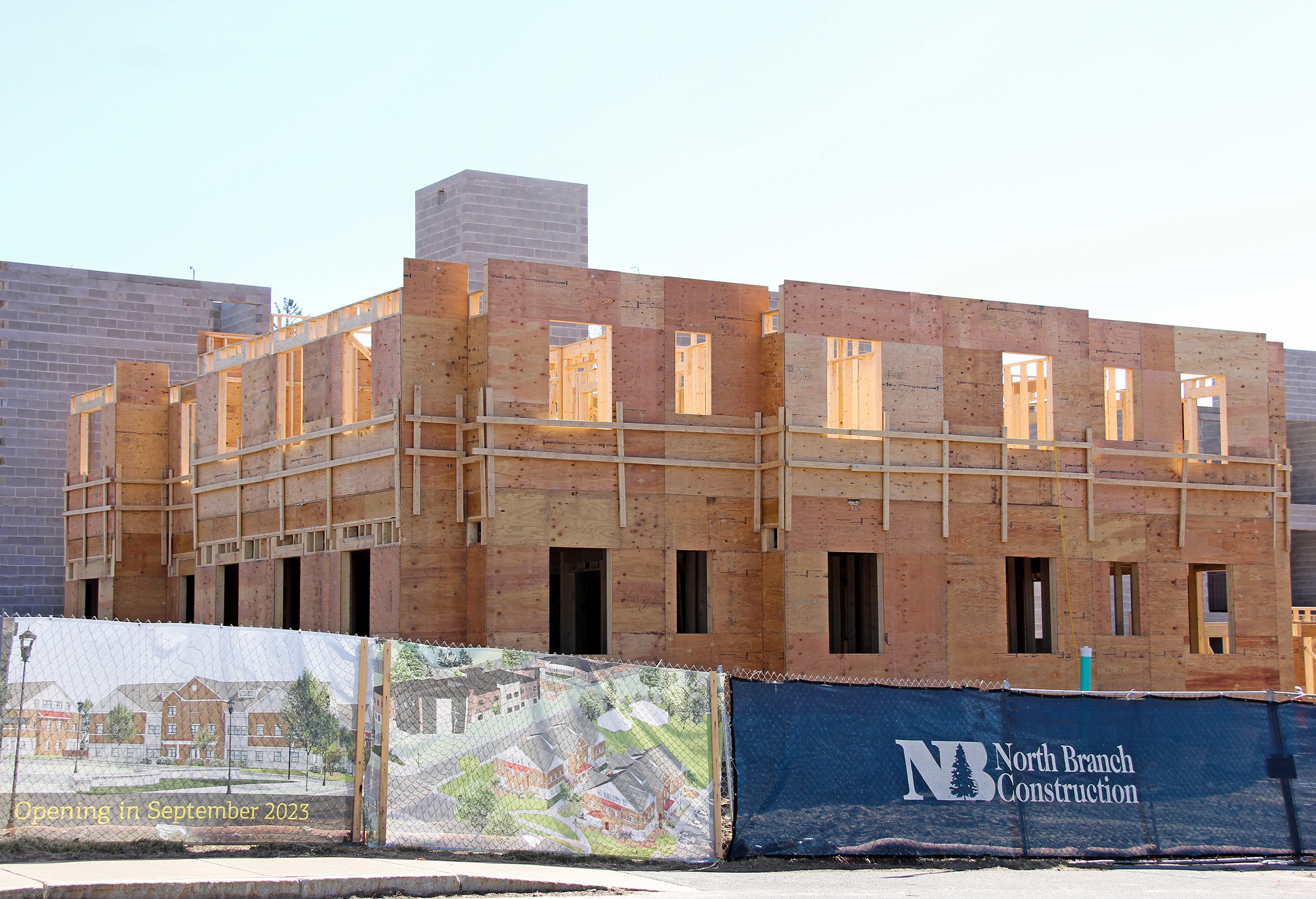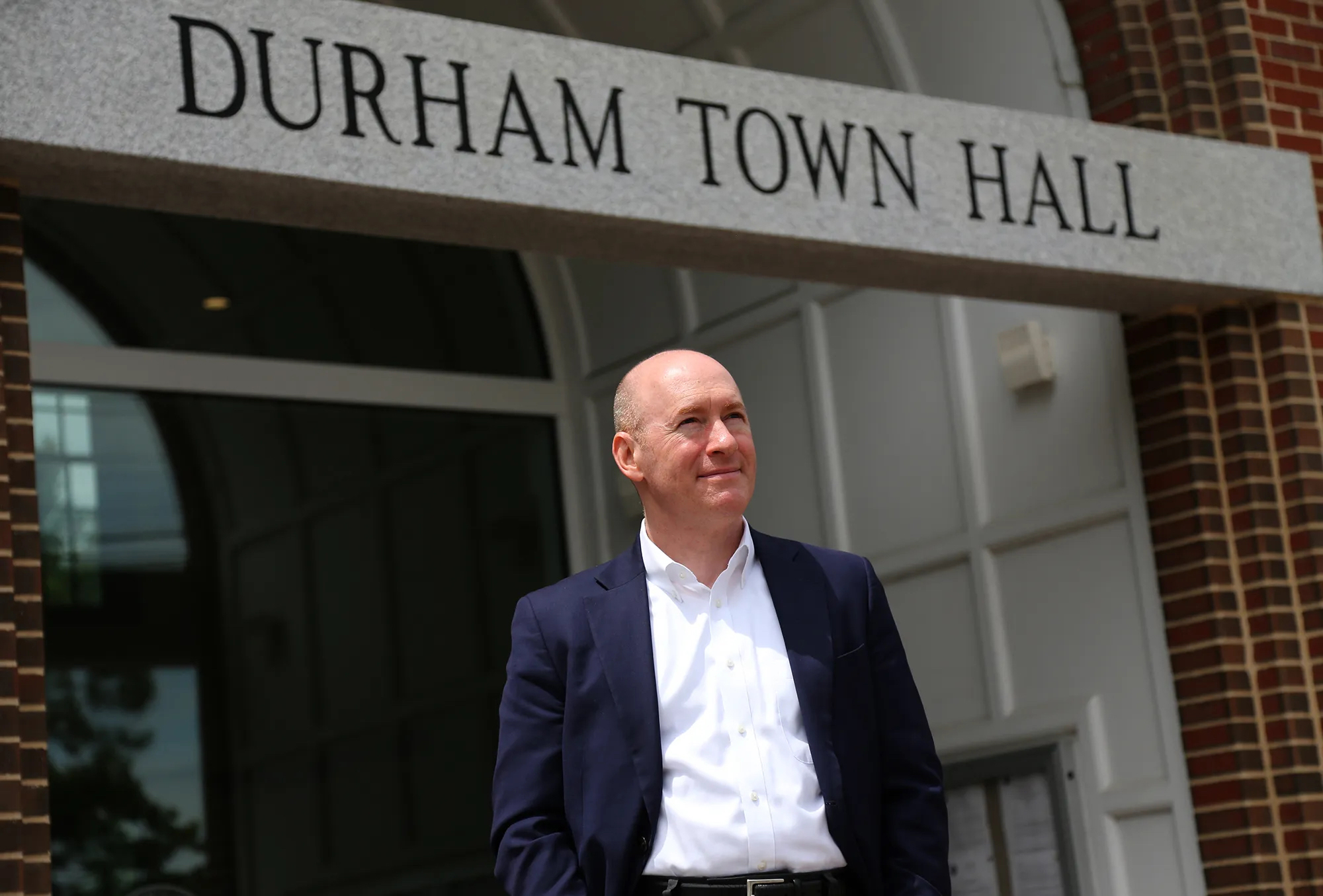Plans for ‘exciting’ Durham multi-use development take shape

Initial construction on the Edge at West End is expected to begin in about three years, says Marian McCord, UNH’s senior vice provost. After a pandemic-induced hiatus, the University of New Hampshire is moving ahead with plans for what’s being called an “innovation ecosystem” that includes university and private company partnerships for research facilities, retail, dining, recreation and housing.
The Edge at West End in Durham is viewed as a place where private high-tech companies can locate to take advantage of UNH assets of research programs, faculty and students, according to Marian McCord, senior vice provost at the university. “The vision for the Edge is that it is going to be this live, work, learn, play community. This is really going to be an innovation ecosystem, not just for our campus but for the region,” she said. “This is a great opportunity for bringing in partners who can benefit from that for growing high-tech jobs region,” she added.
University President Jim Dean, during his state of the university address in February, spoke of The Edge as “one of the most exciting research and job-creating initiatives for UNH in years.”
“The Edge research complex would expand a partially developed commercial site on the western edge of campus. It could also provide room to add housing for graduate students and young professionals,” Dean said.
An accompanying YouTube video noted, “The Edge will increase economic growth for New Hampshire by fostering intensified university business partnerships.”
Based on inquiries they’re receiving and what they’ve seen with other universities in the region engaged in similar endeavors, university officials are confident there is a demand for what’s envisioned here. The University of Massachusetts–Lowell has its Research Institute, while the University of Connecticut has its Tech Park.
For example, IXBlue, creators of an autonomous seafloor mapping vehicle, is a private company currently located at UNH’s John Olson Advanced Manufacturing Center at 121 Technology Drive in Durham.
“But they’ll soon outgrow that space,” according to the YouTube narrative. “Other campus partners are eager to expand their footprints in Durham and deepen their engagement with UNH research.”

A preliminary rendering of how The Edge at West End might look at the University of New Hampshire in Durham. Rendering was taken from a YouTube video about the project.
‘Languished for years’
The initial concept of The Edge dates back to late 2018, but was upended — as everything was — by the Covid-19 pandemic that took root beginning in March 2019 and festered for some three years.
McCord came on board as vice provost in February 2020, only to have the project derailed.
“It languished for a few years,” she said.
“We had to reevaluate — was it still the right direction to be going? And it was basically so many partners requesting to be co-located here that helped to convince us that yes, this is still the right thing to do.”
The Edge is envisioned for about 60 acres on Old Concord Road/Main Street near the town of Lee boundary, behind the U.S. Forestry Service building in the vicinity of the West Edge parking lot.
The amount of new construction versus repurposing existing buildings and the sequencing of construction hasn’t been determined yet, according to McCord.
“We will be working with a real estate construction group to help us sort through how we’re going to make this happen and evaluate those choices,” she said.
The full buildout will likely take about 20 years, according to McCord, with the hope of initial construction starting within three years. At least 1,000 people — and likely many more than that — are likely to populate The Edge at any one time as residents, workers and visitors, she noted.
A slide presentation she shared during an interview showed a possible $1 billion in economic impact over a 10-year period involving sponsored research, royalties, construction, job creation, startup jobs and tax revenue.
She described the potential tax benefit to the town of Durham as “transformative.”
Durham Town Administrator Todd Selig agrees that the potential is significant, noting, “I have high hopes for it.”
“The assessed property value of private industry co-located at The Edge would be fully taxable, creating synergies and partnerships for UNH undergraduates, graduate students and faculty members, revenue flow for the university itself, and much needed new property tax revenue for the Town of Durham,” said Selig.

Durham Town Administrator Todd Selig sees significant potential in the massive UNH development: ‘I have high hopes for it,’ he says. (Foster’s Daily Democrat photo)
“The prospect of The Edge hosting a residential component, combined with an influx of new workers within large private industries there, would expand the potential customer base for our local downtown businesses, particularly Durham’s restaurants,” he added.
McCord views The Edge as a community unto itself, but one that complements and enhances Durham as a whole.
The housing would be for not only UNH-related folks but for employees of the businesses that locate there. Dining, recreation, possibly even medical facilities, would be a part of the mix. New jobs will be available, and UNH students will have opportunities for internships.
“I think it will bring a lot more vibrancy to Durham, a lot more people. So it’s going to be, I think, a really fantastic thing for the town,” she said.
Selig said he sees additional benefits beyond the job opportunities and tax revenue.
“It would also further the Durham and UNH climate action goals,” he said. “At the present time, the site is largely occupied by outdated, inefficient single-story utility structures and open expanses of impervious parking lots. The redevelopment would employ modern, state-of-the-art stormwater management, green buildings and connectedness to the UNH core campus and downtown Durham.”
“Most citizens and legislators don’t realize that UNH and Durham do a great deal together, including stormwater management, our joint public water system, wastewater treatment, public safety, fire prevention, transportation, substance abuse prevention, joint facilities planning, cooperative bidding, and much, much more,” he added. “Like in marriage, there can at times be differences of opinion, but we’re a strong family nonetheless.”
Rivier begins work on new residences
Construction of Rivier Village, two new apartment-style residence halls at Rivier University in Nashua, has begun, with a fall opening anticipated.
The new facilities will occupy a city block across from the Science and Innovation Center on South Main Street.
Sister Paula Marie Buley, president of the university, said Rivier has seen record enrollment, and “expanding our residential facilities was identified as the next initiative in our multi-year strategic plan.”
She said the addition of men’s and women’s ice hockey to the university’s NCAA Division III lineup has increased enrollment of a more geographically diverse student body.
Additional enrollments in Rivier’s nursing and business programs, as well as an increase in international students, have also contributed to the university’s growth, she said.
Designed for upper-level students to live more independently, each apartment suite will contain four-to-six single bedrooms, multiple bathrooms, a living room, a full kitchen, and washer and dryer units. A 12-month rental option will be available. The village concept will include open, green areas and a parking space for each student housed in the apartments.